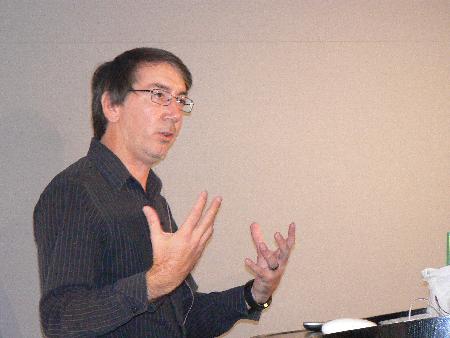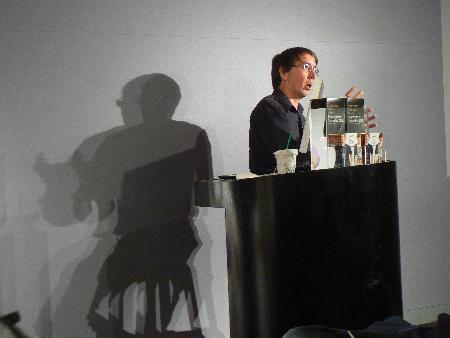Live from London: Will Wright talks Spore
We're reporting from his Apple Store talk

It's an exciting week if you've been eagerly awaiting EA's Spore game. It's being released on pretty much every gaming platform, including mobile, iPhone and handheld. And the game's creator, Will Wright, is in town to talk about it.
He kicked off this afternoon with a talk at the Apple Store in Regent Street.
Although not strictly handheld or mobile focused – he did talk about the general inspiration for Spore, which is relevant to Pocket Gamer. At least, that's our excuse for bagging a front-row seat.
Carry on reading for our filed-as-live report.

Striding on-stage with a "generic Frappuccino" (i.e. a Starbucks coffee strategically covered with tissues), Wright started by talking about his inspirations. "I spent most of my childhood building models," he said, adding that as a child, he was hugely interested in the space programme.
"We were going to have things like jet-packs, atomic-powered cars, and this optimistic view of what the future was going to become," he said, citing further fascination with alien intelligence and, ahem, homicidal robots.
"It was really interesting for me as an adult to see this future NOT unfold," he says. "It gave me an interest in the future, and why things are inherently unpredictable."
He also talked about the history of aliens in fiction, from Yoda to Alf and everything in between. "Robots were kinda similar," he says. "They were trying to recreate human beings. In some sense, both aliens and robots tell us more about ourselves. They're filters or lenses for understanding humanity."
Given the surroundings, it was probably tactful to mention that Wright's first computer was an Apple II, which he used to connect to, yes, robots. And it was at this time he got interested in the SETI programme, which he cites as a key inspiration for Spore.
(If this seems breakneck-paced, it's because I'm writing it as he talks, and he's talking very fast. Sorry about that.)
He also showed off some of his first prototypes for Spore – Wright likes to design a mock box for every game idea he has, which in this case was SimEverything, complete with a mock specs box. He also read "hundreds" of science books in the initial research stages.
A key process was looking at things like Star Wars, and deconstructing its story into its key elements – light sabres, Yoda, Darth Vader, the Death Star and so on. However, Wright's favourite games, he said, are the ones that are "generative" - where you create the story through play.
"By giving the players tools, we're letting them create their own epic space opera," he said, and went on to point out that kids are "inherently creative", but that "education is the process of teaching us the things we can't do" (i.e. beating this creativity out of us).
Still keeping up?
The gist (sort of) is that Wright and his team put a huge amount of time and effort into making the tools in Spore, so that people would use them to play, and effectively create their own storylines, rather than following a pre-destined path.
"Normally when people build tools, they think about how to make the tools more powerful or more functional, but they don't usually think about how to make them more fun," he said.
Wright says he wanted to have a scientific basis to Spore, but teamed with the creativity of making your own creatures. He's clearly chuffed with the success of the Spore creature creator.
"The community is almost becoming more important than the game itself," he says. "It's cool, we want to have these communities having a life of their own."
He expected the Creature Creator would generate around 100,000 creatures by the time Spore itself was released this week. "Instead, we got that many in 22 hours roughly!" he says.
"We hit a million in about a week, and we're somewhere over three million unique creatures currently. And right now, there are only about 1.5 million species on Earth."
Wonder how many of those are penis-head monsters (search on YouTube for 'spore penis' if that reference baffles you, but don't blame us...)

Anyway, Wright talks about this community being "harnessed into a metabrain", and says he was hugely surprised at the creativity of the community.
"We didn't think they could make robots, humans or realistic animals, but they could," he said. "Even things that aren't creatures at all." At this point, he showed a slide of cars, planes, motorbikes and boats, all made using the Creature Creator.
Wright also said the Creature Creator almost brought down YouTube's servers at its peak, as so many users were uploading videos of their creatures.
He also talked about the celebrities who've made Spore creatures, including Richard Branson, David Lynch and Carlos Santana.
Back to the game. "It's only with modern computing technology that we can give players the chance to create rich, diverse life forms," he said, saying that he's never seen a good evolution-based game.
"The most important lesson I wanted players to come away from Spore with is that anybody can be creative," he says. "It's the closest compulsion that players will experience within Spore."
At this point, Wright moved onto a demo of the main Spore game (presumably on a Mac, since we're in the Apple Store). I'll try to pick out the parts that are generally relevant, what with this being Pocket Gamer.
Interestingly, social networking sites like Facebook were a big influence on the final game - with the ability to tag creatures, set up buddy lists and so on.
That's something that's clearly carried over into the mobile versions - I'm saying this, Wright didn't at the time - but connectivity is a big element in both the mobile and iPhone versions.
He showed off the generative music feature of the main Spore game (as in PC/Mac), which music boffin Brian Eno made for the game.
As you'd expect, Will Wright's saved Spore game is, well, pretty far on in the game, in the Civilization mode. I half wanted to look away at this point, to not spoil it for myself.
He did sportingly ensure the demo didn't last all afternoon by launching a nuclear strike against every other civilization on his planet, for a laugh, before building a cool spaceship.
Some more thoughts from me - you can see how this concept of creativity and play translates through to the mobile versions, in the fun you can have adding bits and bobs to your Spore in Spore Origins on those platforms.
It's necessarily cut-down in terms of scope, graphics and just about everything else, but you can see how Wright's core principle - the fun of creativity - has been carried through to the mobile game.
Whether that makes a good game, of course, you'll have to wait for our review to find out.
Wright ended with a Q&A session. Was there anything he had to leave out due to technology restrictions? "Not really, but there were a couple of things due to design and usability issues," he said, citing the ability for players to create underwater civilizations.
"In most cases, we ended up exceeding our original goals," he says, citing the procedural music and the social networking features.
Is it a massively multiplayer game? No, said Wright, it's a massively single-player game. Why? Because of the design drawbacks of MMOs, for example not being able to let players cheat or otherwise shape the world - "or blow up entire worlds with these huge powers".
Would girls like Spore?
"We tested the game extensively on casual players, who tended to be more female," he says, saying that the creativity toys have big appeal for this audience.
"That may be a more attractive form of entertainment for these gamers than the more mission and goal-based form of gameplay," he said.
Interestingly, Spore is the first Will Wright game to have difficulty levels: Easy, Medium and Hard. Easy has been tuned so fans of The Sims can work their way through the game easily, while Hard is apparently so ninja that "I haven't completed it myself!"
And that's a wrap. Oh, apart from the 'What's Next?' question.
"I've got some ideas I've been working on in the background, but I don't want to talk about them yet!" he chuckles. "There's certainly no lack of ideas..."
